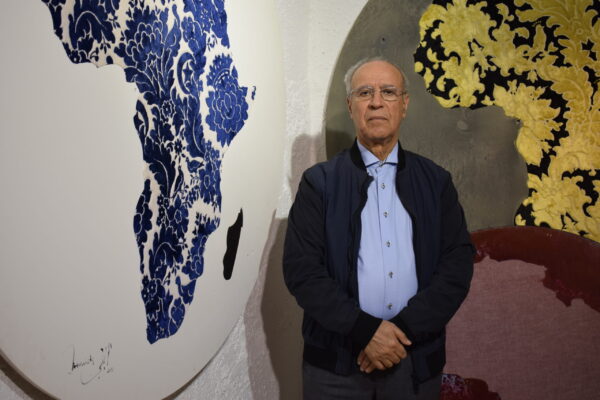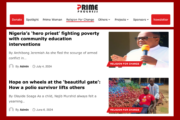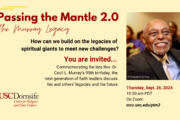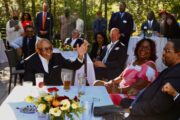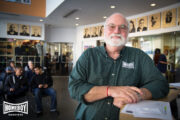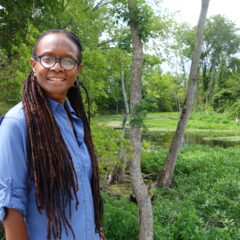This article was originally published in Religion Unplugged, with the support of CRCC’s global project on engaged spirituality.
In the cavernous dining room of an artist-friend, Ahmed Toufiq quickly eats a fresh olive-speckled feta salad. But his pace slows as he peels the layers of an aromatic meat tagine slow-cooked in a clay pot.
“You see, you have to be patient,” says 76-year-old Toufiq, Morocco’s Minister of Religious Endowments and Islamic Affairs. He radiates the soul-searching quality of a Sufi mystic. “Just as the culinary flavors need savoring, so does the soul to reach its illumination.”
Toufiq, a Moroccan writer and scholar, has for over 17 years served as the Islamic affairs minister in the council of King Mohamed VI, who moved swiftly to revise the country’s constitution in 2011 after the Arab Spring unrest and set the stage for a more democratic regime.
Regime Change
Since the late-1990s, Morocco has promoted moderate Islam to push back against radicalism at home and as an antidote to the Wahhabi tradition of Saudi Arabia with its links to Salafi jihadism.
Following the Maliki School of Islamic thought, Moroccan Islam has relied heavily on Sufism to unite Moroccans and further the country’s interests abroad.
Though the kingdom preaches the acceptance of different faiths, King Mohammed VI, who claims to be a direct descendent of Prophet Muhammad, is the ultimate voice on Islam in the country. He acts as a buffer against extremist voices even as his position remains largely unchallenged, with the royal family ruling for over 400 years.
When the king’s father Hassan II ascended the throne in 1961, Morocco witnessed violent internal turmoil as Salafism’s appeal grew due to the kingdom’s close ties with Saudi Arabia. Public resentment and mistrust also escalated as Hassan II centralized power in his hands over the next three decades.
So, when Mohammed VI took charge in 1999, he liberalized the regime to restore public peace. Not only did the new king set out to bring religious reform and improve the country’s human rights record, but also made countering of extremist threats the centerepiece of his policy.
In revitalizing the regime, Mohammed VI installed Ahmed Toufiq, a Sufi and Moroccan scholar, as the Minister of Islamic Affairs, to replace his more conservative predecessor Abdelkebir M’Daghri.
Toufiq’s obvious public influence in the Kingdom of Morocco hasn’t eclipsed his commitment to Sufism—his soul’s “primary quest” and one that informs his life and work.
“Sufism is an essential part of Moroccan culture; it’s more social than theoretical,” he says, spooning out some meat tagine, a distinctly North African dish. “I grew up among mystics and storytellers who emphasized on social cohesion and compassion, healing and kindness to fellow beings.”
Establishing a legacy through education
Born in the High Atlas Mountains of Marrakech where ethnic groups of indigenous North Africans fuse their native beliefs with syncretic influences, Toufiq grew up in a community with a strong social and spiritual pulse and religious mysticism as its focus.
But it was a chance meeting with the Boutchichiya Sufi order’s renowned saint Sheikh al-Abbas, and later his son Sidi Hamza and grandson Sidi Jamal that set Toufiq on what he calls the authentic Sufi path.
“The new path was attracting the young due to its emphasis on tolerance and humility,” he says. “I became firm in my conviction that pretensions were not compatible with Sufism.”
The Boutchichiya Sufi order originated in the eighteenth century in northwest Morocco as a moderate form of asceticism, allowing the believer to seek spirituality without disengaging from worldly pursuits. It delineated a roadmap toward establishing a social-cum-faith-based-order, laying down a common spiritual discipline among its followers.
Bred in this kind of Sufi sociability, Toufiq believes abstinence from worldly pursuits or complete withdrawal from materialism is not the answer to spiritual growth.
“Contrary to abstinence, one should embrace the idea of respecting people in their specific circumstances, serve and help them attain peace,” he says.
Toufiq’s commitment to authenticity as a Sufi has informed his intellectual pursuits.
In 1989, he was appointed as the director of the Institute of African Studies at the Mohammed V University in the capital city of Rabat by the late King Hassan II.
As the institute’s director, Toufiq brought in new text laws, vocations, and activities to bridge the religious heritage between Morocco and the rest of Africa.
“There was a strong focus on academics and breaking prejudices that had reared their heads during the colonial period. It was an exciting experiment from scratch,” he says.
Impressed by the success of this institute, the late king appointed Toufiq as the director of the General Archives Library in Rabat to revive its large collection of manuscripts and historical periodicals that had been dealt a blow since the end of the French colonial regime.
To keep up with Morocco’s long tradition of preservation and restoration of antiquities, Toufiq set up a laboratory for the revival of valuable manuscripts, renewed the library’s national record, and pushed for an internal congress for archives.
Toufiq’s scholarship was recognized internationally, too.
The Harvard Divinity School invited him to teach a course on Sufism in 2001, where he focused on the different stages of spiritual perfection in Islam. A few years before that, he spent an academic year at the University of Sorbonne Nouvelle in Paris to lecture on historical Arab thinking and analyses of the Quran.
He recalls his academic pursuits as those “based on rigorous rules of methodology,” but his Sufi experience as vital “for the meaning it gave to my life and to the world.”
In his lectures and academic pursuits even now Toufiq emphasizes that a “correct Muslim” is not surprised by the multiplicity of faiths and cultures—an approach that has spilt into his political career since his appointment as the Minister of Islamic Affairs in 2002.
A new counterterrorism, with mixed results
Since then, Morocco’s export of a moderate Islam, with King Mohammed VI at the helm of affairs, has been welcomed both within the kingdom and outside.
After the Casablanca bombings of 2003 when 45 people were killed in a spate of synchronized suicide attacks, the king insisted that Morocco maintain a moderate interpretation of Islam and warned against extremist foreign interpretations of Islam.
This tolerant image of Morocco has been necessary geopolitically since King Mohammed VI– who rules over both religious and secular realms of the Kingdom–seeks to champion a moderate Islam that can serve as an international model. Besides boosting diplomatic ties with the West, the Kingdom has used religion as soft power to expand its economic and social imprint in North and West Africa.
Toufiq calls himself “just a servant of the King,” but many crucial developments in the country to boost its image of tolerant Islam have taken place during his appointment.
In 2014, the kingdom set up King Mohammed VI Institute for the Training of Imams, Morchidines and Morchidates in Rabat to motivate both men and women from Morocco, sub-Saharan Africa and Europe to become teachers of moderate Islam, grow as religious ambassadors and help combat extremist ideologies.
Students training at the institute claim that Morocco’s brand of Islam is an antidote to religious extremism and violence in other parts of the world.
Even Pope Francis on his first apostolic visit to Morocco last year took note of the institute’s thrust toward a more moderate interpretation of Islam and inter-faith dialogue.
King Mohammed VI also set up a foundation for religious scholars in 2015 for the exchange of knowledge and practices to ensure “the protection of the Muslim faith and the spiritual unity of the African peoples against all violent trends.”
Yet, Morocco’s reformist thrust to manage domestic terrorism and ultraconservative Salafism hasn’t sufficiently curtailed the ideological strains of extremism appealing to Moroccans abroad. In 2017, a group of Moroccan terrorists drove a van into a crowd in Barcelona. Another terrorized the Spanish town of Cambrils, killing 15 people and injuring over 120. In Finland, too, an 18-year-old Moroccon asylum seeker killed two and injured eight in a knife attack. Moroccan networks were also implicated in terrorist attacks in Paris and Brussels.
Some scholars believe Morocco hasn’t held up the best record on human rights despite the hope of a softer approach to state-society relationship since the new king’s ascension.
“The Moroccan state behaves like a closed monopoly, and human rights development has been more cosmetic than structural,” says Osama Abi-Mershed, an associate professor of history and director of the Center for Contemporary Arab Studies at Georgetown University in Washington.
Still, Morocco continues to position itself as an international model of religious reform.
With counterterrorism at the heart of global agendas, the Moroccan state is not restricting its pacifist approach to its territorial boundaries. It has taken the imam training program to Europe and beyond to cement cultural and religious ties and to preserve mosques abroad. It has also signed 36 new religious conventions with African countries over the last decade or so to counter extremist threats, stamping moderate Islam’s appeal on the global stage.
With Morocco pivoting to a new position globally, Toufiq’s stature as the religious affairs minister has grown. But the quiet and low-key Sufi dressed in an immaculate white robe and a deep-red fez hat on days when he gives his crisp western suit a pass, disagrees.
Toufiq believes his work as a historian, essayist and novelist have helped him stay in touch with his spiritual center and serve those in need.
“I started writing novels lately to bring to light certain aspects of our Islamic heritage,” he explains. “My book Abu Musa’s Women Neighbors, for instance, embraces the idea that heaven is nearer to those who feel their hearts broken by sin.”
Observing human acts as “a mirror of the soul,” 76-year-old Toufiq believes “only philanthropy based on a transcendental belief can save it from becoming mere business.”
Central to his thinking about the transcendental quality of the world is his conviction that women play a critical role in human society—a theme recurrent in all his novels.
“Women offer life, care and joy,” he explains. “They are far more important for human society because of their aesthetic qualities, profound emotions, endurance and sacrifices.”
Click here to read the story on religionunplugged.com.
Priyadarshini Sen is a journalist fellow with the Spiritual Exemplars Project.
